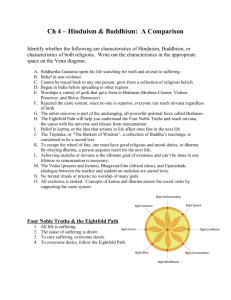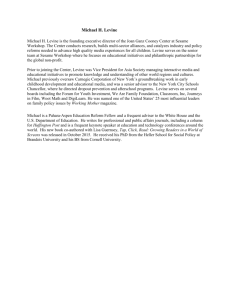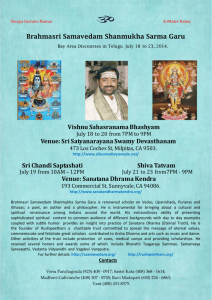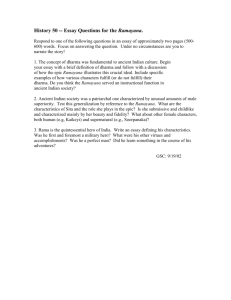Ashé Journal - Ashe Journal
advertisement
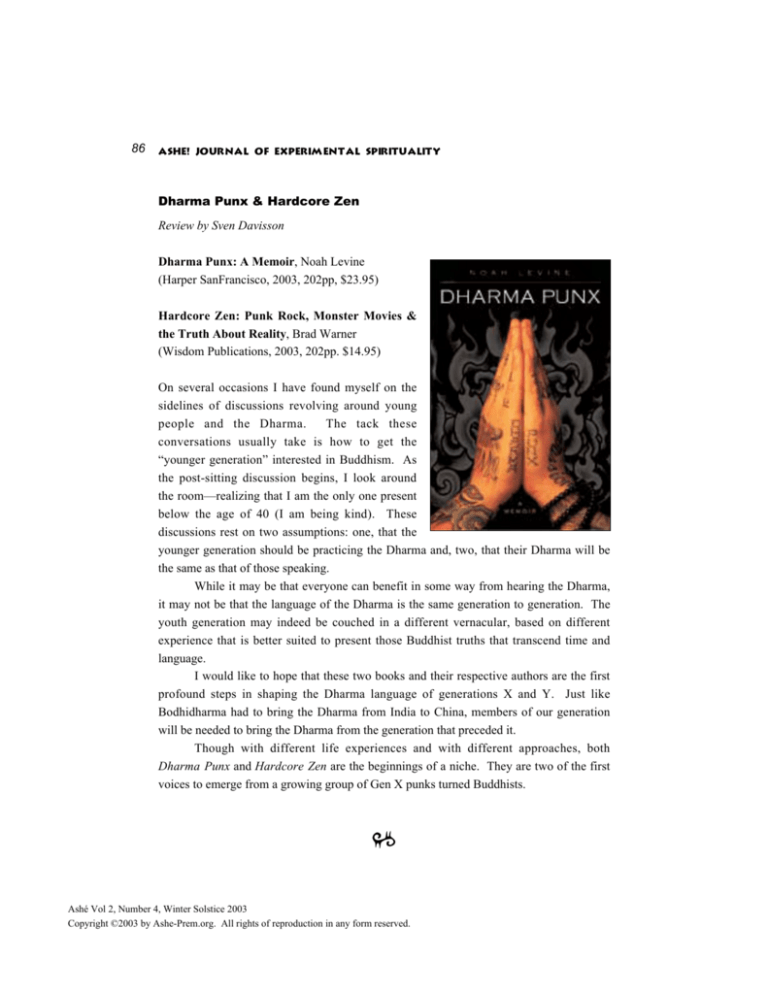
86 Ashe! Journal of Experimental Spirituality Dharma Punx & Hardcore Zen Review by Sven Davisson Dharma Punx: A Memoir, Noah Levine (Harper SanFrancisco, 2003, 202pp, $23.95) Hardcore Zen: Punk Rock, Monster Movies & the Truth About Reality, Brad Warner (Wisdom Publications, 2003, 202pp. $14.95) On several occasions I have found myself on the sidelines of discussions revolving around young people and the Dharma. The tack these conversations usually take is how to get the “younger generation” interested in Buddhism. As the post-sitting discussion begins, I look around the room—realizing that I am the only one present below the age of 40 (I am being kind). These discussions rest on two assumptions: one, that the younger generation should be practicing the Dharma and, two, that their Dharma will be the same as that of those speaking. While it may be that everyone can benefit in some way from hearing the Dharma, it may not be that the language of the Dharma is the same generation to generation. The youth generation may indeed be couched in a different vernacular, based on different experience that is better suited to present those Buddhist truths that transcend time and language. I would like to hope that these two books and their respective authors are the first profound steps in shaping the Dharma language of generations X and Y. Just like Bodhidharma had to bring the Dharma from India to China, members of our generation will be needed to bring the Dharma from the generation that preceded it. Though with different life experiences and with different approaches, both Dharma Punx and Hardcore Zen are the beginnings of a niche. They are two of the first voices to emerge from a growing group of Gen X punks turned Buddhists. u Ashé Vol 2, Number 4, Winter Solstice 2003 Copyright ©2003 by Ashe-Prem.org. All rights of reproduction in any form reserved. Ashe! Journal of Experimental Spirituality 87 Noah Levine, author of Dharma Punx, is the son of meditation instructors Patricia Washko and Stephen Levine. He is currently involved in teacher training with Jack Kornfield at Spirit Rock Meditation Center. Levine himself is director and co-founder of Mind Body Awareness Project, a program that works with incarcerated youth. Hardcore Zen author Brad Warner is a former member of the influential hardcore band Zero DeFex and the creative mind behind the critically lauded Dementia 13. Warner currently lives in Japan working for the studio responsible for the television series Ultraman. He received Dharma transmission from Zen master Gudo Wafu Nishijima. Both books are written in the first person with varying emphasis on personal experience. Levine spends much of Dharma Punx talking about the life that eventually brought him to meditation and the Buddha’s teachings. Like most young people he rejected the belief paradigms of his parents, dismissing both meditation and Buddhism. He began hanging out Noah Levine in the punk/skater scene and quickly started using the drugs endemic to that scene. From the plagues of this life, he was incarcerated several times. During one of these stints in the hands of the correctional system, Levine finally decided to heed his father’s simple advice and watch his breathing. It was through this first step at meditation that Levine made his way ultimately to the Dharma. He discovered the straight edge movement within the hardcore scene and began to identify with Krishna Core, the spiritual side of the straight edge scene. He began to attend workshops and spiritual retreats where he met the English born monk Ajahn Amaro who eventually became his teacher. In Hardcore Zen, Warner discusses his own road to the Dharma. Like Levine, Warner was part of u Ashé Vol 2, Number 4, Winter Solstice 2003 Copyright ©2003 by Ashe-Prem.org. All rights of reproduction in any form reserved. 88 Ashe! Journal of Experimental Spirituality the American hardcore scene. He managed to escape the potential for criminal activity and focused on the musical aspects—first as leadsinger for Zero DeFex and, later, as the creator of Dementia 13. Warner ended up moving to Japan where he realized on of his dreams and landed a job working in monster films. Warner spends more time in his book actually discussing the philosophical aspects of the Dharma. He includes a very telling explication of the Heart Sutra. He paints in vivid detail the road that led him, very reluctantly, to receiving Dharma transmission—completing the transition from punk rocker to Zen master. Important for their generation, both Levine and Warner deconstructs the Dharma, questioning it every step of the way. Through this they extract the important elements while leaving aside the more potentially loaded religious aspects. In this Brad Warner way they begin to cast the Buddha’s truths in ways that are more accessible to their generation—born as it is from skepticism and not the idealism of the generation before—quoting Johnny Lydon, Henry Rollins and Bart Simpson along the way. Noah Levine’s website: Brad Warner’s websites: http://www.dharmapunx.com http://www.hardcorezen.com http://www2.gol.com/users/doubtboy/ u Ashé Vol 2, Number 4, Winter Solstice 2003 Copyright ©2003 by Ashe-Prem.org. All rights of reproduction in any form reserved.

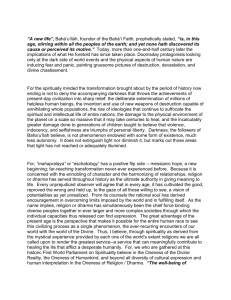


![[#SEAD-614] Create Project Space for Moore Lab Group](http://s3.studylib.net/store/data/007834021_2-e246955aacca9cfb92a906a1234e44a5-300x300.png)

